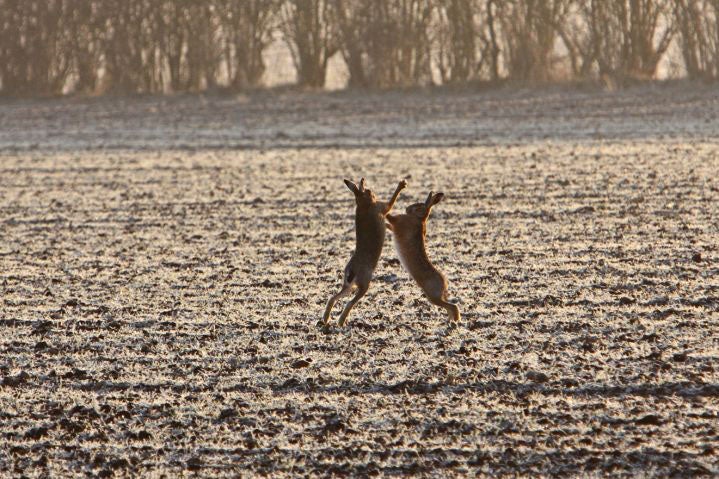Must we shoot Britain’s mad March hares all the year round?
For every other game species, there is a closed season. Why not for hares?

Your support helps us to tell the story
From reproductive rights to climate change to Big Tech, The Independent is on the ground when the story is developing. Whether it's investigating the financials of Elon Musk's pro-Trump PAC or producing our latest documentary, 'The A Word', which shines a light on the American women fighting for reproductive rights, we know how important it is to parse out the facts from the messaging.
At such a critical moment in US history, we need reporters on the ground. Your donation allows us to keep sending journalists to speak to both sides of the story.
The Independent is trusted by Americans across the entire political spectrum. And unlike many other quality news outlets, we choose not to lock Americans out of our reporting and analysis with paywalls. We believe quality journalism should be available to everyone, paid for by those who can afford it.
Your support makes all the difference.I spent last Saturday morning watching mad March hares.
Legend and idiom have it, of course, that in the month of March the brown hare behaves in ways so energised and excited as to seem unhinged; and legend and idiom, for once, have it right. To watch the antics of hares in the courtship season, dashing around in circles, leaping into the air and “boxing” with their front paws, is one of the most singular sights of the countryside, and I was riveted.
I was with Gill Turner, an enthusiastic hare watcher and photographer, and we were deep in the great barley plains, the wheat tundra, of eastern England, on the land of a farmer friend of Gill’s who, unusually, likes his hares too much to shoot them, and so they are flourishing. We saw a couple of dozen: in one field there were 14 of them, gathered in small edgy groups, often of two males pursuing a female, which is where the boxing comes in: it’s the female (usually) fending off unwanted suitors.
At one point, two of them came over a rise in the ground towards us and Gill whispered at me to keep still; they kept on coming until they were about 35 yards away. “They don’t look upwards; they think we’re a tree,” Gill murmured. In the binoculars, I thought I could touch them: I could see every detail of their startling handsomeness, not least the bold black ears. Then, idiotically, I dropped my bins slightly to look with my open eyes; the hares caught the movement and exploded away in different directions, nought to 45 in less than two seconds, beating any sports car.
They are wonderful animals. I wouldn’t want to take anything away from rabbits, their nearest relatives, but sorry bunnies… you just don’t compare. Yet here’s a strange circumstance. Hares are the only game species in Britain without any closed season for shooting. You can shoot them all year round; you can shoot the does (the females, the plural of doe) when they are pregnant; you can shoot them when they are suckling the leverets, the young hares, so the orphaned youngsters starve to death.
Is that not unnecessarily cruel? For every other game species – deer, pheasants, partridges, grouse, not to mention game fish such as trout and salmon – the law enforces a closed season for hunting, when the creatures are allowed, at least, to breed in peace. Why not for hares? This is surely an anomaly, and last year the Scottish Government put an end to it north of the border, and there is now a closed season for brown hares in Scotland running from February 1 to September 30.
An increasing number of wildlife lovers think this should be replicated in England, and a campaign for a hare closed season is gathering force: last year, 146 MPs signed a House of Commons early day motion supporting it. Yet Richard Benyon, the wildlife minister who has a freely admitted passion for shooting, and owns a shooting estate in Berkshire and a grouse moor in Scotland, has set his face against it. Mr Benyon has refused to meet the campaigners, and handed over the job of drafting a code of practice for “hare management” to the British Association of Shooting and Conservation – the shooting lobby.
The BASC draft code deals with the question of a formal, legal closed season by avoiding it entirely. So this morning there will be another letter on Mr Benyon’s desk from the campaigners, who include Care for the Wild International, the Hare Preservation Trust, and Humane Society International, asking for the job of drawing up a code to be taken away from the shooting lobby and be given instead to Natural England, the Government’s wildlife agency. That seems eminently reasonable to me. So does the campaigners’ request, repeated in their letter, for a meeting with Mr Benyon.
Why not give the brown hare the same protection in the breeding season as enjoyed by every other game species, mammal, bird and fish? And if – as it is starting to seem – you want to block the idea, Minister, because of your personal enthusiasm for shooting, why not meet the campaigners to talk about it openly?
Wouldn’t that be democracy in action?
Photo: Andy Fisher
m.mccarthy@independent.co.uk Twitter: @mjpmccarthy
Join our commenting forum
Join thought-provoking conversations, follow other Independent readers and see their replies
Comments